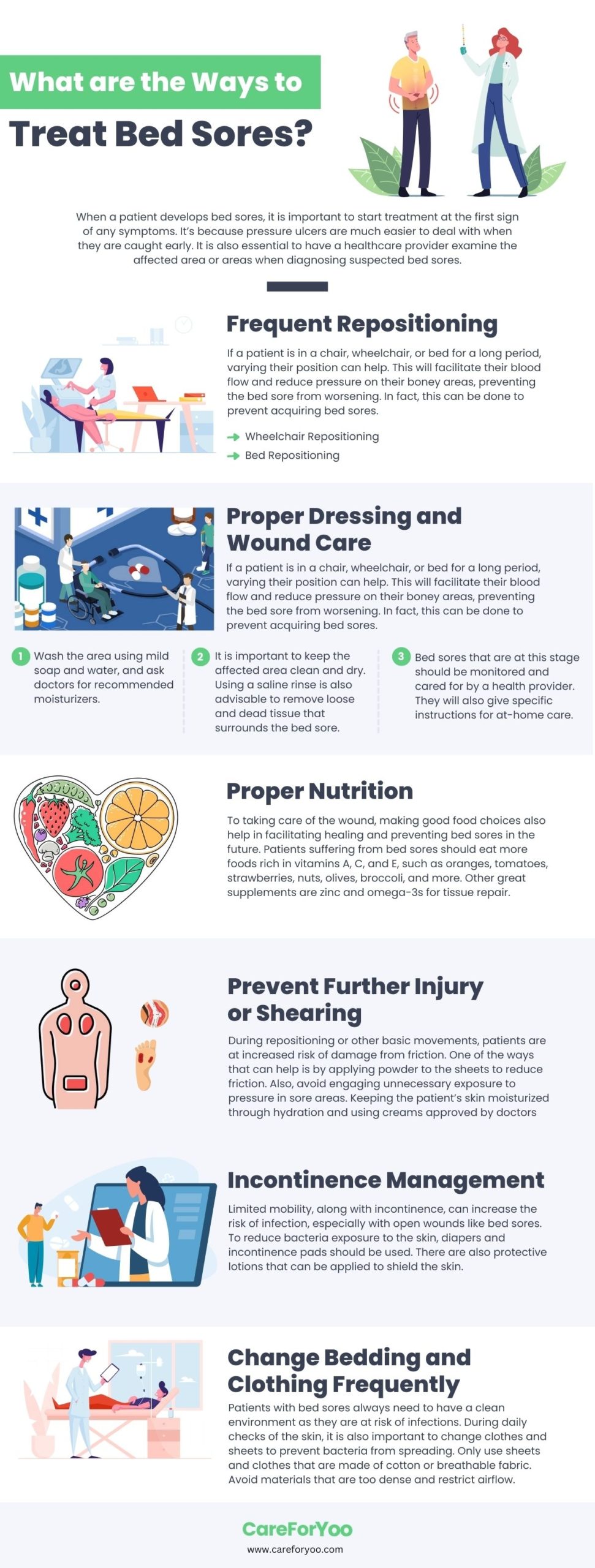Bed sores, also known as pressure ulcers or decubitus ulcers, are a type of injury that affects the skin and underlying tissues, mainly caused by prolonged pressure on the skin. They can be extremely painful and even life-threatening if left untreated. Preventing bed sores is of utmost importance to ensure the health and well-being of individuals, especially the elderly and those who use wheelchairs (limited mobility).
This guide will explore the main causes of bedsores, which includes pressure, poor nutrition, exposure to moisture, and medical conditions such as diabetes and vascular disease. Understanding these causes is important for the early detection and prevention of bed sores.
Pressure
Bed sores develop when the skin and soft tissue are kept under pressure for a long period of time, which obstructs blood flow to the affected area. This can occur due to high pressure over a short period or lower pressure over a longer time period, leading to tissue damage and the formation of bed sores.
- Pressure Damages The Skin And Tissues: When pressure is exerted on the skin over a prolonged period, it can cause damage to the skin and underlying tissues. The pressure disrupts the flow of blood through the skin, depriving the affected area of oxygen and essential nutrients, which are important tissue function.
- The impact Of Pressure On Bony Areas: Bony areas of the body are particularly vulnerable to pressure injuries due to the limited cushioning they provide. The risk of pressure injuries on these areas is greater in patients who spend most of their time in one position. Common areas of concern for pressure injuries include the back, buttocks, hips, shoulders, elbows, ankles, heels, and back of the head.
Friction
Friction occurs when skin rubs against a hard surface, such as a bed or the arm of a wheelchair. This force creates heat, which can lead to the removal of the top layer of skin, causing damage.
- Friction Can Damage The Skin And Contribute To Bed Sores: Friction can cause damage to the skin and underlying tissues, and when combined with pressure, can create the perfect conditions for bed sores to develop. When the skin experiences friction, the outermost layer of skin cells can get damaged, which can lead to inflammation, irritation, and breakdown of the skin.
- Friction Can Be Exacerbated By Moisture: This is because moisture makes the skin more slippery, meaning it can take more force to push against it and cause more damage. Additionally, when the skin is wet, it can become weaker and more susceptible to damage from friction.
Shearing
Shearing is a term used to describe the detachment of the skin from the tissues beneath it. This can occur when a patient is in a partially upright position and their skin adheres to the bedding, causing the skin to shear as the underlying tissues move downwards.
- Shearing Can Damage Skin And Contribute To Bed Sores: When tissues are pulled or moved in opposite directions, as can occur with shearing, it can cause significant damage to the skin and underlying tissues. This damage can be severe when combined with a lack of blood flow, which can occur in areas like the lower back due to gravity.
- Shearing Can Be Exacerbated By Other Factors: It can be exacerbated especially when combined with other factors such as pressure and friction. When an individual is lying or sitting in one position for an extended period of time, the skin and underlying tissues can get a lot of pressure and friction. This can lead to skin breakdown and the formation of painful bed sores.
Moisture
Constant exposure to moisture can cause the skin to soften, which can make it more susceptible to injury. When the skin is wet for a long time, it can break down more easily, which can lead to the formation of bed sores. Moisture from sources like sweating or even from being in a wet environment, can worsen the condition of an already damaged skin.
- Moisture Can Cause Skin Breakdown And Maceration: Skin that has been exposed to moisture for an extended period of time may lead to skin breakdown and develop a condition called maceration, which causes the skin to become overly soft and more vulnerable to damage from pressure.
- Common Causes Of Moisture That Contribute To Bed Sores: Moisture caused by urinary or fecal incontinence, sweating, or wound drainage can increase the risk of bed sores. These conditions can cause the skin to soften, swell, and become wrinkled, making it more prone to damage from external factors like pressure and friction. Exposure to urine and feces is also one of the most common causes of skin breakdown, which can ultimately lead to the development of bedsores.
Poor Nutrition
When a person’s nutrition is poor, their body’s ability to heal tissue damage is greatly impaired. This is particularly relevant for individuals with bedsores, as the lack of essential nutrients such as protein, vitamins, and minerals can lead to slower healing times and increased risk of infection. Malnourished individuals may have less energy and be unable to move frequently, leading to prolonged pressure on certain areas of the body, further increasing the risk of bedsores.
- Nutrient Deficiencies And Their Effects On Tissue Healing: Inadequate nutrition can play a significant role in the formation of bed sores. Malnutrition, which may involve insufficient intake of nutrients or specific nutrient deficiencies, is a common nutritional risk factor that can hinder the healing of tissues. Factors such as poor appetite, inability to self-feed, insufficient consumption of calories, protein, and fluids, as well as lack of understanding about how important breakfasting is, can all contribute to malnutrition and ultimately result in the development of bedsores.
- Dehydration Can Also Worsen Skin Health: Dehydration can have a negative impact on skin health, causing it to become dry, tight, and flaky. This can result in increased susceptibility to pressure, friction, and tearing, especially in elderly individuals who are confined to their beds. In addition to this, dehydration can also hinder the healing of wounds by reducing blood volume and oxygen levels in the skin, which are essential for the delivery of nutrients required for proper healing.
Medical Conditions
Medical conditions that limit mobility, such as paralysis, can lead to bed sores due to prolonged pressure on certain areas of the body. When a person is unable to change positions or move around, the pressure on specific areas of the skin can reduce blood flow to the tissues, causing damage to the skin and underlying tissues.
- Medical Conditions That Increase The Risk Of Bed Sores: Bed sores can develop in people with Peripheral Vascular Disease due to decreased blood flow, which impairs healing from pressure ulcers. Spinal Cord Injury can increase the risk of bed sores by causing paralysis or loss of sensation in specific body parts. Similarly, in diabetes, high blood sugar levels can damage blood vessels and nerves, weakening the skin’s ability to heal, and increasing the risk of bed sores.
- Impaired Sensation Or Mobility: People who have difficulty moving or changing position while seated or in bed, such as those with spinal cord injury or poor health, are at a higher risk of bedsores. Additionally, inability to feel pain or discomfort can also cause a lack of awareness of warning signs and the need to change position, further increasing the risk.
Conclusion
Bed sores can be life-threatening in advanced stages and cause severe pain and discomfort. The main causes of bedsores include pressure, friction, shearing, moisture, and poor nutrition, while existing medical conditions can also exacerbate the situation. Understanding these causes is crucial for the early detection and prevention of bed sores. It is essential to seek medical care for existing bedsores to prevent more complications, which makes it important to keep an eye on early symptoms.
Regular repositioning, a skin care routine, and proper nutrition can prevent bed sores. Malnutrition, which involves insufficient intake of nutrients or specific nutrient deficiencies, is a common nutritional risk factor that can hinder the healing of tissues, making proper nutrition an important element in the prevention and treatment of bed sores.


